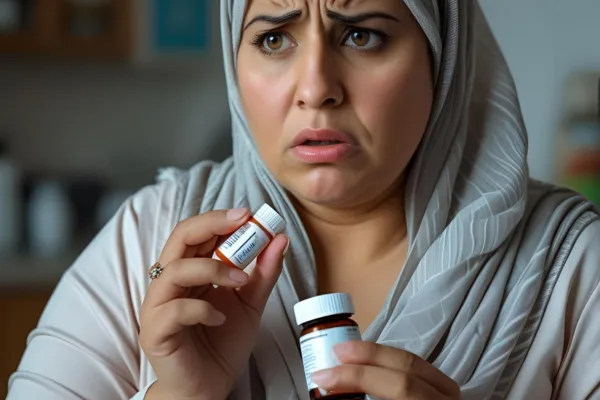
What Happens If You Stop Taking Your Medication?
What Happens If You Stop Taking Your Medication?
If you've ever thought about stopping your medication — you're not alone. Many people wonder:
“Do I really need this?”
“It’s not like I feel better.”
“What’s the point of taking pills every day if nothing changes?”
These are honest questions. And they deserve honest answers. In this post, we'll explore what happens when you stop medications, why you may not feel better even while on them, and how to build a safe, long-term plan for your health — one that doesn’t leave you feeling stuck or powerless.
1. Why You May Not Feel Better on Medication
Medications are often prescribed to manage conditions like:
Here’s the thing: many of these illnesses are silent at first. They don’t always cause pain or obvious symptoms. So when you take medication and don’t feel an immediate difference, it can seem pointless.
But that doesn’t mean the medicine isn’t working.
For example, with high blood pressure (hypertension), you may feel perfectly fine — even while your blood vessels and heart are being damaged quietly. The medication helps lower the pressure to reduce your risk of stroke, heart attack, and kidney failure.
— American Heart Association (2022)
Similarly, diabetes medications can help lower blood sugar and reduce the risk of complications, even if you don’t feeldifferent day to day. Left untreated, high blood sugar can damage your eyes, nerves, kidneys, and increase your risk for heart disease.
2. What Can Happen If You Stop Taking Your Medicine Suddenly?
Stopping your medication without a plan can be dangerous. It may cause:
Blood pressure spikes, leading to stroke or heart attack
Blood sugar highs, which damage organs and nerves
Worsening cholesterol, raising your risk for heart disease
Mood swings or relapse, if you’re on medication for depression or anxiety
Withdrawal symptoms, especially with medications like antidepressants, steroids, or beta blockers
In fact, a study published in the Journal of General Internal Medicine found that patients with chronic diseases who stopped their medications without supervision were more likely to experience hospitalizations or emergency room visits (McCarthy et al., 2021).
3. It’s Okay to Want Off Medication — But Do It the Right Way
If you're thinking about stopping your meds, you're not wrong for wanting more from your health.
You might feel:
Tired of the side effects
Frustrated by the cost
Overwhelmed with all the pills
Disappointed you don’t feel healthier
These are all valid feelings.
The good news? You may not need to stay on medications forever. Many people, especially those with lifestyle-related conditions like Type 2 diabetes, prediabetes, high cholesterol, or high blood pressure, can reduce or stop some medications with the right plan — but not overnight.
Functional medicine and integrative care models focus on finding the root cause of illness and using lifestyle changes — like food, movement, sleep, stress support, and mindset — to reduce the need for medications.
— Institute for Functional Medicine (IFM.org)
4. What’s the Safe Way to Stop (or Reduce) Medication?
Here’s what to do before stopping any medication:
✅ 1. Talk to your doctor or pharmacist
They can help you understand:
What the medication is doing
What risks come with stopping
Whether tapering is needed
Suddenly stopping meds like insulin, blood pressure meds, antidepressants, or steroids can cause serious side effects or rebound symptoms.
✅ 2. Review your labs and vitals
Make sure you’re tracking things like:
A1C (blood sugar over time)
This gives you and your provider a clear picture of whether your body is ready for a medication change.
✅ 3. Build a lifestyle-based plan
Your chances of getting off medication go up when you:
Improve your diet (especially a lower-carb, anti-inflammatory plan)
Move your body regularly
Sleep 7–9 hours
Reduce chronic stress
Heal your gut and lower inflammation
Studies show that lifestyle changes — especially nutrition, weight loss, and stress management — can improve or even reverse conditions like prediabetes and Type 2 diabetes.
In the Diabetes Prevention Program (DPP) study, lifestyle changes reduced the risk of developing Type 2 diabetes by 58%, compared to just 31% with medication (metformin).
— Diabetes Prevention Program Research Group, 2002
5. If You Want to Feel Better — You Deserve a Plan That Works
You don’t have to stay stuck.
There’s a difference between managing symptoms and building health. If you feel like you’ve been managing disease, not healing — it might be time for a new approach.
Here’s what we recommend at Rx Health and Wellness:
Start with small changes. One meal, one walk, one step at a time.
Focus on what’s in your control — like food, movement, stress, and sleep.
Track your progress. Blood sugar logs, symptom journals, or energy levels.
Find support. You don’t have to do this alone.
And when the time is right, we’ll help you and your healthcare team explore whether medication changes make sense — safely and responsibly.
Final Thoughts
It’s understandable to feel frustrated with taking medication, especially if you don’t feel any better. But stopping suddenly can cause more harm than good.
Instead, build a plan to get better — the kind of plan that supports your body, your health goals, and gives you back control.
If you're ready to explore a new path toward feeling better and using less medication, check out our coaching, courses, and community designed for people just like you.
References
American Heart Association. (2022). Understanding Blood Pressure Readings. https://www.heart.org
McCarthy, D. et al. (2021). Impact of Medication Non-Adherence on Emergency Visits and Hospitalizations in Chronic Disease Patients. J Gen Intern Med.
Institute for Functional Medicine. (n.d.). What is Functional Medicine? https://www.ifm.org/functional-medicine/
Diabetes Prevention Program Research Group. (2002). Reduction in the incidence of Type 2 diabetes with lifestyle intervention or metformin. N Engl J Med. https://www.nejm.org/doi/full/10.1056/NEJMoa012512
Would you like help formatting this post for your blog (headers, SEO title, meta description, featured image, etc.)? Or turning this into a downloadable checklist or email campaign?
